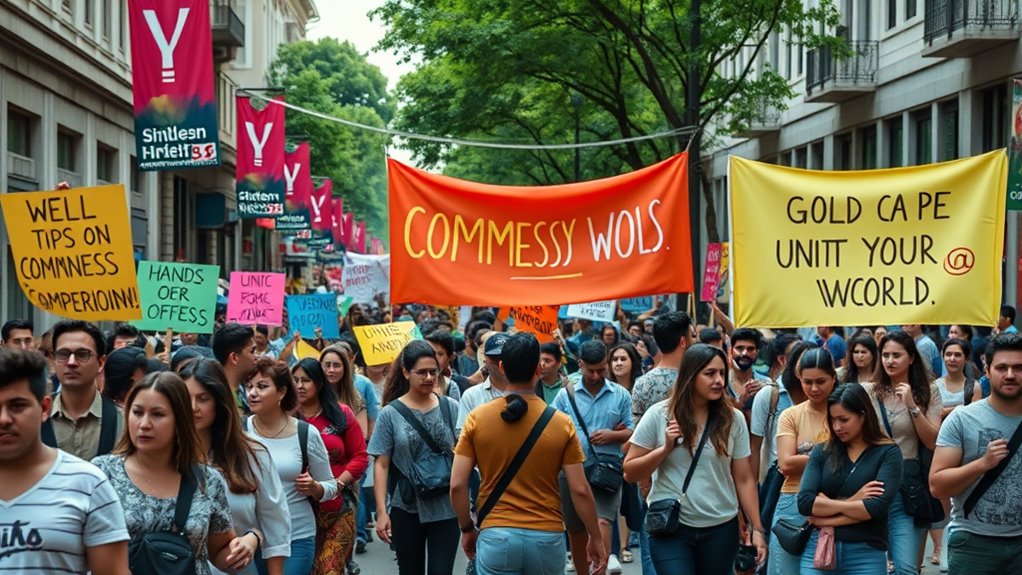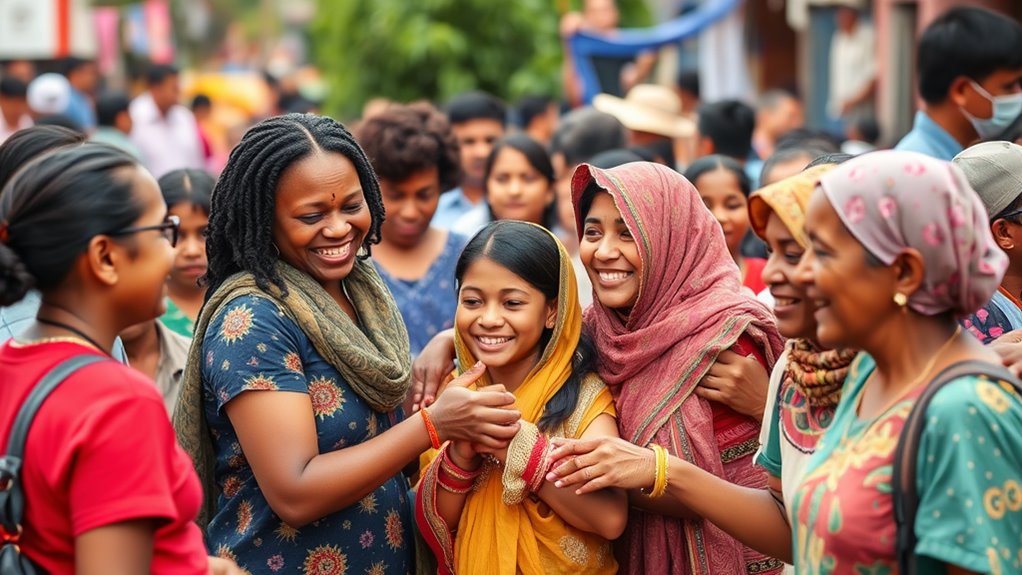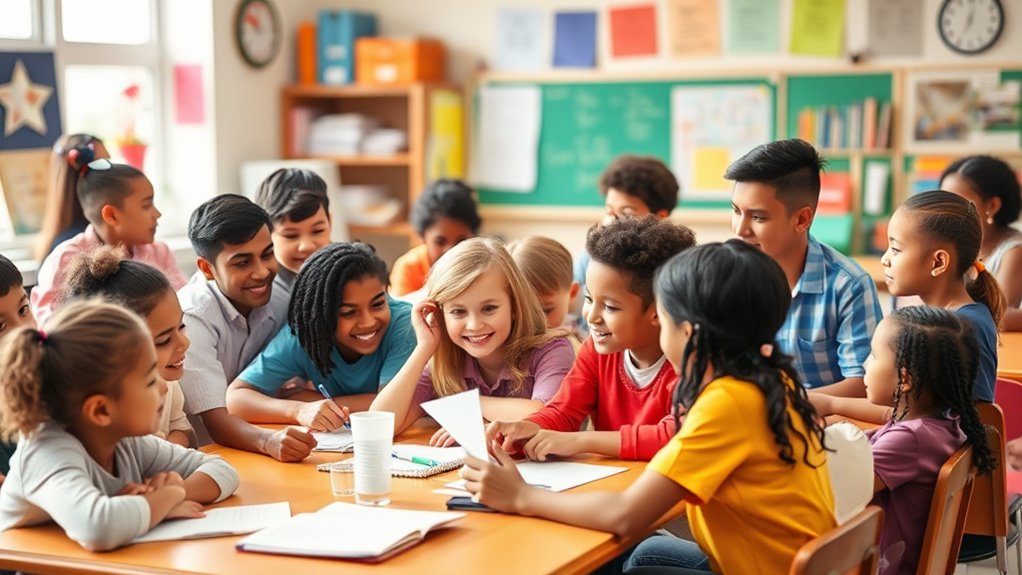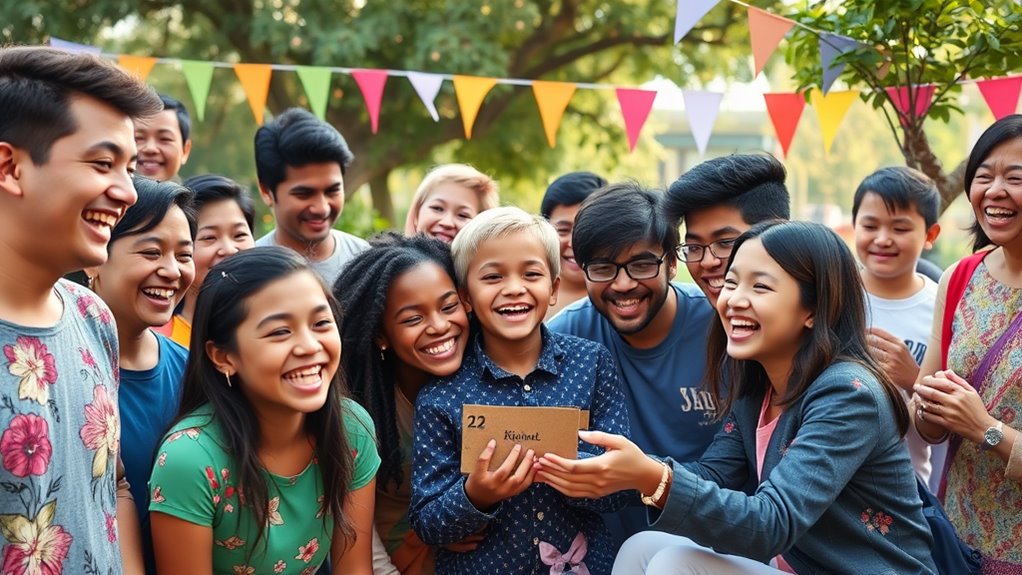Imagine a world where everyone's nice. You'd see smiles and small acts of kindness everywhere, sparking a ripple effect of positivity. This kindness boosts trust and strengthens relationships, creating open communities where everyone feels valued. With collaborative efforts addressing global challenges, kindness could drive significant social change. You'd notice improved mental health all around, as people experience less stress and more happiness. Schools would thrive with a culture of respect, and workplaces would feel more supportive. Life satisfaction would increase, enhancing overall quality of life. There's so much more to explore about this transformative concept.
Essential Insights
- A world where everyone is nice would foster a culture of kindness, enhancing emotional well-being and reducing stress in communities.
- Trust and collaboration would flourish, leading to stronger relationships and more effective problem-solving on societal issues.
- Increased kindness would create a ripple effect, inspiring collective action and global movements towards social justice and sustainability.
- Communities would experience greater inclusivity and happiness, breaking down social barriers and promoting a higher quality of life.
- Health outcomes would improve as acts of kindness reduce anxiety and depression, contributing to longer, healthier lives.
The Ripple Effect of Kindness

When you perform a kind act, you mightn't realize how far its impact can spread. This is the beauty of the ripple effect of kindness. One small gesture, like holding a door open or offering a smile, can trigger a chain reaction. The person who receives your kindness often feels inspired to pay it forward, creating a kindness contagion that extends far beyond your immediate interaction.
This phenomenon is rooted in the reciprocity effect, where people respond to kindness with similar actions. You might witness someone helping another, and even if you're not directly involved, it motivates you to act kindly too. As you engage in these small acts, you contribute to an empathy expansion within your community, fostering a culture of compassion. Moreover, as research shows, the mirror neurons in our brains play a crucial role in how kindness is mirrored and reciprocated socially.
Imagine walking into a workplace where kindness is the norm. Employees feel valued and supported, leading to increased job satisfaction and productivity.
In schools, prioritizing kindness can reduce bullying and exclusion, promoting a sense of belonging. On a larger scale, global initiatives centered around kindness can tackle issues like poverty and inequality, breaking down barriers and fostering collaboration across cultures.
The ripple effect of kindness can transform not just individual lives but entire communities. You may not always see the results of your kind actions, but know that they resonate, creating a more empathetic and connected world.
Strengthening Relationships and Trust

Kindness doesn't just create ripples; it lays the groundwork for strengthening relationships and trust. When you meet people where they're at, you're not just initiating contact; you're engaging in meaningful relationship building.
Establishing safe spaces for open, honest interactions encourages others to share their thoughts and feelings, fostering a sense of belonging. By actively listening, you show that you value their needs, which is essential for trust enhancement. Trust is recognized as central to collaborative partnerships, making it vital for effective community engagement efforts.
Embodying core values of trustworthiness is important. Being transparent in your actions and intentions helps others see your sincerity. When you demonstrate honesty and integrity, you build a solid foundation for lasting relationships.
Keeping promises consistently and addressing mistakes openly builds credibility and reinforces trust.
In collaborative environments, sharing decision-making empowers everyone involved. By championing autonomy and addressing systemic inequities, you create an inclusive atmosphere that fosters fair relationships.
Recognizing barriers to trust and working to overcome them is crucial for strong connections.
Once trust is established, maintaining it requires consistency and accountability. Reliable behavior over time makes you a dependable partner in any relationship.
Open communication reduces uncertainties and helps manage expectations, while respecting personal boundaries shows that you care. By owning up to mistakes, you reinforce the safety net of trust.
Ultimately, strengthening relationships through kindness and trust creates an environment where everyone can thrive, paving the way for deeper connections and a greater sense of community.
Global Movement and Collective Action

Across the globe, a powerful movement is emerging that harnesses the spirit of kindness to tackle pressing issues such as poverty, inequality, and environmental challenges. This movement thrives on global initiatives and collective empathy, uniting people from diverse backgrounds to create meaningful change.
By working together, you can contribute to solutions that may have seemed insurmountable alone. Here are some key aspects of this movement:
- Global Collaborations: Initiatives like the global effort to combat HIV/AIDS show how partnerships between governments, research institutions, and communities can lead to remarkable outcomes, such as a 52% decline in new infections since the late 1990s. The ripple effect of kindness strengthens these collaborations, fostering trust and deeper connections among stakeholders.
- Diverse Perspectives: Collective action enables individuals from various cultures and disciplines to share their insights, enriching problem-solving and leading to innovative solutions. For instance, the renewable energy movement saw a 25% increase in generation from 2010 to 2020.
- Building Networks: Strengthening networks through initiatives like Catalyst 2030 allows social entrepreneurs to share best practices, enhancing efficiency and collaboration in achieving sustainable development goals.
- Driving Policy Change: Your voice matters! Mobilizing public opinion can influence policy agendas, as seen with the Paris Agreement, which united nearly 200 countries to combat climate change.
Impact on Global Goals

Achieving the Sustainable Development Goals (SDGs) hinges on fostering a culture of kindness, which cultivates interdependence among all individuals. When you engage in kindness initiatives, you're not just uplifting those around you; you're contributing to the broader framework necessary for global cooperation. Kindness enhances happiness and well-being, creating a society more equipped to tackle pressing issues like poverty, inequality, and environmental challenges. Additionally, scientific evidence indicates that kindness can lead to sustained improvements in mental health, further strengthening community bonds.
To illustrate the impact of kindness on the SDGs, consider the following table:
| SDG Focus Area | Impact of Kindness |
|---|---|
| Quality Education | Promotes empathy and emotional intelligence in schools |
| Zero Hunger | Guarantees food security through community initiatives |
| Good Health and Well-being | Reduces maternal and child mortality rates |
| Economic Growth | Increases job satisfaction and productivity |
| Reduced Inequalities | Encourages resource redistribution for equity
Mental Health Benefits of Kindness

Engaging in acts of kindness can substantially enhance your mental health and well-being. When you practice kindness, you not only uplift others but also boost your emotional resilience.
Here are some key benefits of embracing kindness in your life:
- Reduces Symptoms of Depression and Anxiety: Kindness can alleviate feelings of sadness and worry, helping you feel lighter and more positive.
- Enhances Self-Esteem and Happiness: Participating in kindness therapy increases your sense of self-worth, leading to greater overall life satisfaction.
- Strengthens Social Connections: Acts of kindness foster deeper relationships, making you feel valued and heard, which combats loneliness. Greater social connection benefits are observed compared to other interventions.
- Promotes Emotional Well-Being: Kindness releases oxytocin, which boosts your mood and lowers stress by decreasing cortisol levels.
These benefits create a cycle of positivity—when you feel good, you're more likely to be kind again.
Additionally, kindness promotes open communication and builds trust, creating a safe space for interaction. This environment not only nurtures your mental health but also cultivates a community where everyone feels connected.
Physical Health Improvements

Kindness isn't just good for your mental health; it also has profound effects on your physical well-being. When you engage in acts of kindness, your body releases oxytocin, which dilates blood vessels and lowers blood pressure. This means kindness benefits your heart health by promoting healthier blood vessel function and reducing the risk of heart diseases.
Regularly experiencing or witnessing kindness can result in lower blood pressure, contributing to long-lasting health enhancements.
Moreover, practicing kindness can greatly reduce stress levels. When you act kindly, cortisol, the stress hormone, decreases, making it easier for you to lose weight and potentially extend your lifespan. Engaging in kindness can lead to a positive feedback loop that encourages more kind acts and further enhances your physical health.
By lowering stress, kindness helps manage abdominal fat and fosters better overall physical health.
Engaging in kind acts can also encourage a more active lifestyle. Volunteering not only connects you with others but also increases your daily physical activity, leading to improved health outcomes.
This physical activity can lower your risk of chronic illnesses, proving that kindness isn't just an emotional experience; it's a physical one too.
Societal Benefits of Kindness

The benefits of kindness extend far beyond personal health, reaching into the fabric of society itself. When you engage in acts of kindness, you're not just improving your own mental well-being; you're also contributing to a more connected and compassionate community.
Here are some key societal benefits of kindness:
- Enhanced Relationships: Kindness fosters trust and deepens interpersonal relationships, leading to healthier collaborations and communication. When kindness is the foundation, relationships flourish.
- Positive Ripple Effect: Your acts of kindness can inspire others to do the same, creating a chain reaction that increases social connection. This ripple effect encourages a culture of generosity.
- Community Engagement: Kindness campaigns can unite individuals around common goals, addressing local issues like poverty and inequality. When communities come together, everyone feels more supported.
- Global Impact: Kindness transcends borders, becoming a global movement that tackles significant challenges. Whether it's environmental sustainability or social justice, kindness can drive lasting change.
As you participate in kindness, you're not just benefiting yourself; you're helping to build a society where everyone feels valued and connected.
This supportive environment allows individuals to share burdens and collaborate on solutions, ultimately leading to a more peaceful world. By embracing kindness, you contribute to a stronger, more resilient community that uplifts everyone.
Workplace Culture Transformation

Transforming workplace culture starts with a commitment to kindness at every level of the organization. When you model kindness as a leader, you set a tone that encourages employee engagement and fosters a supportive environment. Show appreciation for your team's hard work through gestures like verbal recognition or flexible work hours.
By practicing active listening and giving your full attention, you demonstrate respect and empathy, which are essential for building trust.
Implementing kindness initiatives can greatly enhance work-life balance and overall well-being. Create policies that support flexible hours and remote work, allowing employees to maintain their personal lives while contributing effectively to the team.
Recognizing the importance of mental health and providing support resources, such as stress management training, helps reduce workplace stress, creating a more harmonious atmosphere.
Encourage collaboration by fostering an inclusive environment where teamwork thrives. Regularly ask for feedback and promote open communication, making employees feel valued and respected.
Highlight individual contributions through recognition programs to celebrate achievements, reinforcing the culture of kindness.
Ultimately, aligning your organizational values with kindness transforms the workplace into a positive environment. By incorporating kindness into leadership development and everyday practices, you cultivate a culture that prioritizes transparency, trust, and respect.
As a result, you'll see improved employee engagement and a sense of camaraderie that drives your organization forward. Embrace kindness, and watch your workplace culture flourish.
Kindness in Education

Fostering a culture of kindness in education can markedly enhance student experiences and outcomes. When kindness is integrated into the curriculum, you not only improve academic performance but also nurture social and emotional development.
Here are four key benefits of a kindness curriculum:
1. Improved Academic Performance: Students who engage in prosocial behavior often achieve higher academic success, as kindness boosts motivation and interest in learning.
2. Enhanced Social Connections: Kindness fosters a sense of community, leading to better relationships with both peers and teachers. This supportive environment reduces instances of bullying and promotes empathy.
3. Positive Mental Health: Acts of kindness trigger the release of endorphins and serotonin, which can improve your overall well-being and resilience against stress.
You'll find that kind children have stronger attention spans and are more willing to participate in class.
4. Peer Mentorship Opportunities: By creating programs that emphasize peer mentorship, you can cultivate leadership skills and acceptance of diversity among students, preparing them for future challenges.
Implementing a kindness curriculum not only benefits individual students but also transforms the school climate into a more welcoming and supportive space.
When you prioritize kindness, you're setting the foundation for a flourishing educational environment where everyone can thrive.
Long-Term Effects on Society

Building a culture of kindness in education sets the stage for broader societal changes that resonate well beyond the classroom. When you foster kindness among students, you're laying the groundwork for stronger relationships and trust within your community. People feel valued and respected, leading to deeper connections and meaningful collaborations. As kindness becomes the norm, interpersonal connections flourish, creating a supportive environment where everyone can express their thoughts without fear of judgment.
Moreover, the mental and emotional well-being of individuals improves considerably. Acts of kindness not only boost happiness but also help reduce stress, fostering a sense of belonging that diminishes isolation. When you engage in kindness initiatives, you're not just helping others; you're also enhancing your own emotional health.
As this culture of kindness spreads, it fuels a global movement that transcends borders. Kindness ambassadors inspire others to embrace compassion, addressing pressing issues like poverty and inequality through collective action. This shared commitment to kindness fosters community engagement, breaking down barriers and promoting unity.
The long-term effects of a kinder society are profound. You'll witness improved health and well-being, increased access to education, and positive changes in local economies. As kindness circulates, it encourages others to repeat good deeds, creating a ripple effect that enhances the entire community.
Ultimately, when everyone embraces kindness, you contribute to a brighter future for all, transforming society into a more compassionate place.
Frequently Asked Questions
How Can I Practice Kindness in My Everyday Life?
You can practice kindness in your everyday life through simple, random acts and thoughtful gestures.
Pay for the coffee of the person behind you or leave encouraging notes for strangers to find.
Smile at people you pass and compliment someone's outfit.
Donate your time at a local shelter or help a coworker with a project.
These small actions create a ripple effect, spreading positivity and reminding others that kindness is always appreciated.
What Are Some Examples of Kindness in Different Cultures?
Different cultures express kindness through unique rituals.
In Southern Africa, Ubuntu emphasizes community support, while Japan's Omotenashi anticipates others' needs, showcasing hospitality.
Greece values Philoxenia, welcoming travelers with warmth.
Iran's Wall of Kindness encourages giving without transactions, reflecting Persian hospitality.
These cultural expressions of kindness not only foster connection but also inspire you to adopt similar kindness rituals in your daily life, creating a more compassionate world.
Does Kindness Have Any Drawbacks or Negative Effects?
Imagine pouring your heart into every act of kindness, only to feel drained and unappreciated.
This kindness paradox can lead you to attract needy individuals who engage in benevolent manipulation, using your generosity for their gain.
You might find yourself neglecting your own needs, feeling anxious or even worthless.
While kindness is beautiful, it's essential to recognize its potential drawbacks, like exhaustion and unbalanced relationships, that can overshadow your genuine intentions.
How Can Kindness Be Taught to Children Effectively?
To teach kindness effectively, engage children in kindness activities that promote emotional intelligence.
You can model respectful behavior, like thanking support staff, and encourage active listening during conversations.
Role-playing scenarios helps them practice kind responses, while discussing feelings fosters empathy.
Implement a Kindness Curriculum filled with stories and projects, and celebrate their kind acts with a "kindness tree."
What Role Does Kindness Play in Conflict Resolution?
Kindness plays a crucial role in conflict resolution by facilitating empathy development and effective conflict mediation.
When you respond with kindness, you disarm hostility and create a safe space for open dialogue. Staying calm and using gentle communication helps transform adversaries into humans, fostering understanding.
